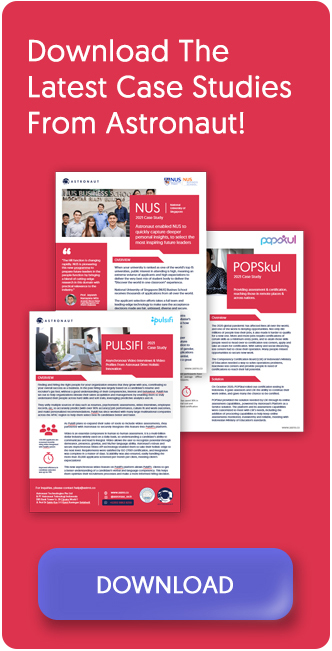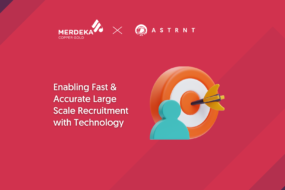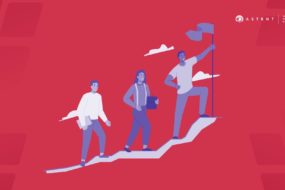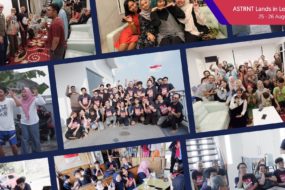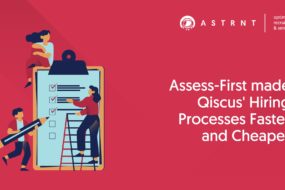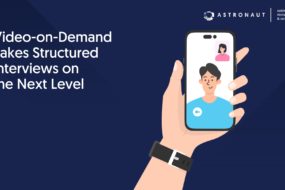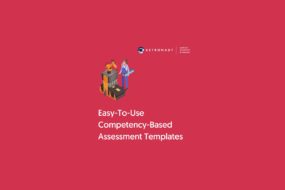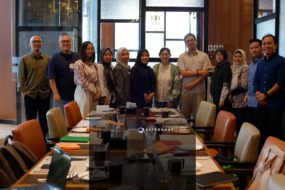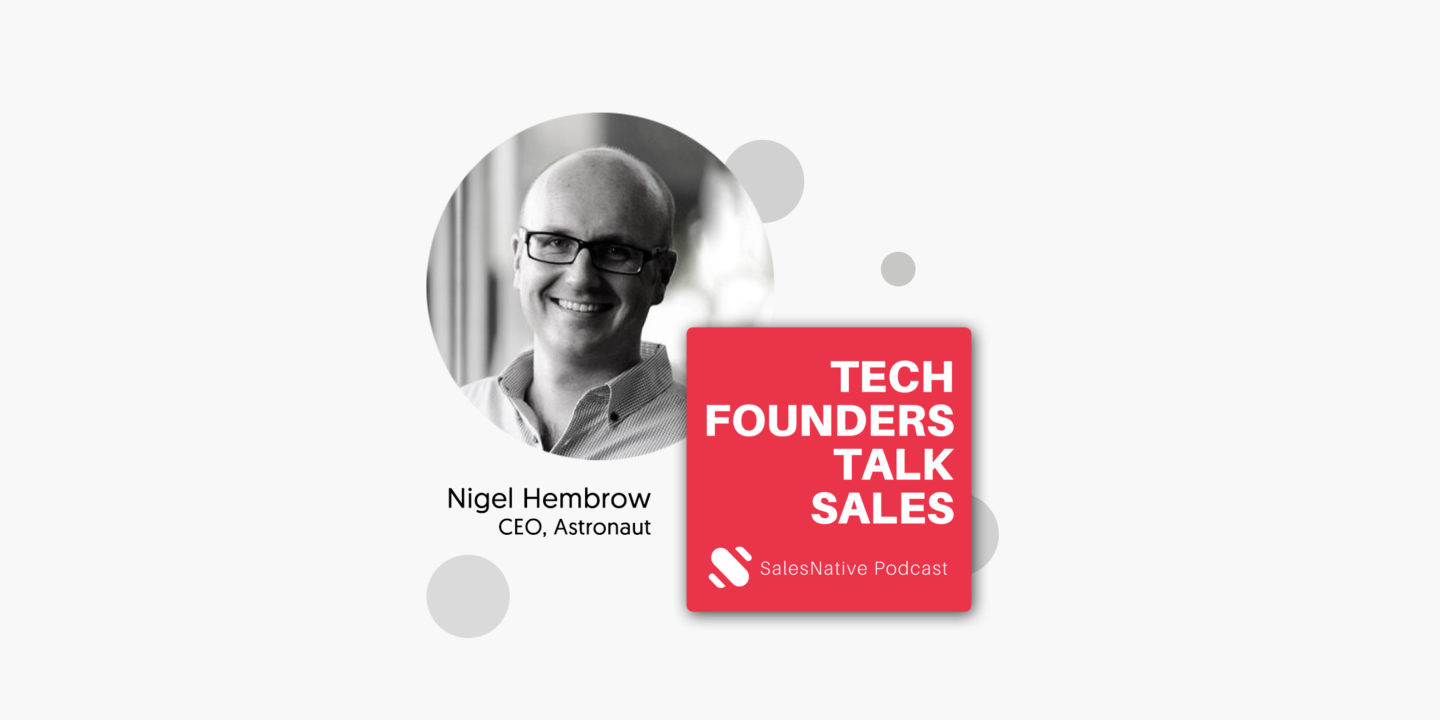
Last week, our Co-Founder, CEO Nigel Hembrow had a great chat with Sidney Minassian of SalesNative about how we get started on our journey. We are happy to share our story!
Listen to the podcast on this link if the audio player doesn’t load.
[archiveorg podcast_salesnative-podcast-tech-fou_nigel-hembrow-astronaut_1000407477227 width=640 height=30 frameborder=0 webkitallowfullscreen=true mozallowfullscreen=true]
Full Podcast Transcript
Sidney: Welcome to the SalesNative podcast, where tech founders share their most valuable sales lessons. I’m Sidney, from Sydney, founder of SalesNative. And today’s guest is Nigel Hembrow, founder, and CEO of Astronaut based in Jakarta, Indonesia. Nigel, welcome to the show.
Nigel: Thanks, Sid, it’s great to be with you.
Sidney: It’s good to have you here. So Astronaut is a fast effective Q&A screening tool, which your candidates will love. Well, I’d love to learn about this business, but first I want to know, why did you start the company?
Nigel: Yeah, that’s a very good question because it’s a big decision to start a company. We’ve dedicated a lot of time, it does change one’s life. So I’ve been lucky. Actually, I turned 40 yesterday to have..
Sidney: Happy birthday.
Nigel: Thank you very much. Traveled and lived in lots of different places, experienced different cultures. I was born, the generation that saw the internet come in, so I understand what is like to not have an email address, for example, and the reason I’m sort of framing it that way is because I found myself, over the last eight years, is when I moved to Singapore after being an engineer in the property development industry in London and Australia, and realized that there’s so much interesting stuff going on, and the world is changing so fast. That, you know, working on large-scale projects, you know, such as buildings, that are very slow. It was just not as exciting as what some, software and communications technology could bring.
So really, it was about, it was about six years ago that I got involved in a turnaround business software startup. And I took over that as a founder and that even though I was based in Singapore, it brought me to India, almost on a monthly basis. We had a team in Delhi, a team in Mumbai. And what I learned from that also having done a bit of headhunting before, was that I became I’m quite interested in the way that people did personal branding, the way that people were getting to know each other online in all the different, you know, types of platforms. You know, dating all the way through to, you know, to LinkedIn for example. And sort of recognize that quick hacks were things that I really needed to use to build my team, that I was building in India, even though I wasn’t on the ground and I was able to startup.
So we didn’t have, you know, internal talent acquisition team, I had to do it largely myself. And so I experimented a lot with WhatsApp and it taught me a few things around how candidates like to interact with companies, and how quickly they wanted to get to know them and understand really what’s going on inside the company. And then, again, like from my perspective is, I was trying to do recruitment as efficiently as possible. What were the tricks that I could use to get to get to know candidates fast?
So, you know, I experimented with lots of different things, you know, including just chatting with candidates, setting a time to chat. I really didn’t do any Skype calls and moved to a lot of asynchronous communication. So at the time of the Indian venture that I was running, it was it was as a SAAS enabled to marketplace for outdoor media, because of that I was learning a lot about different business models in the marketplace space. And we ended up very much understanding that we’re a SAAS company.
So coupled with that, and coupled with my wife, I got married to an Indonesian in Singapore. She was finishing her Ph.D. there. As I was stepping away from the Indian business, I thought, “Hey, I’ve got to focus on Indonesia, we’re based here in Singapore.
I absolutely love recruitment and getting to know people and building teams. And recognized that asynchronous video, because of a couple of different business models around the world that we were looking at, presented an opportunity to create a platform. I didn’t know whether it was going to be a social network, I didn’t know whether it was going to be, even B2C or B2B, but we knew that we could validate pretty quick. I knew that I could build a team. I knew that want to do it in Indonesia. I’d already had the experience in building a team in India. And so I turned to Indonesia, found a great tech co-founder Manfred, and we built a team around the concept of using asynchronous communication, particularly video as a way to get to know candidates really quickly.
We then also fundamentally understood that candidates need to understand companies. So we think of it as a two-way get to know you process, is really the core problem that we solve. And we got into business trying to get our first product alive as fast as possible and to get to starting revenue. It’s a bit of a long answer to your question, but yeah, that’s why we started the business.
Sidney: That’s perfect. That’s a very rich answer. I love that. I think it’s a good mix of your personal and professional story. I think some takeaways just out of your story, two things. One is, the big idea is sometimes right under our nose, right? And it comes from the things that we have to do and the struggles that we have in the way we go about doing business and that’s where your next idea may come from.
And the other awesome one is the quick hacks and the testing. So while I’m imagining you’ve invested some time and money in building up what is today Astronaut, you started off using WhatsApp and experimenting with that and testing other forms of asynchronous communication to validate your concepts around how candidates want to learn about a company, and how a company wants to learn about a candidate. So wonderful.
Nigel: Exactly, yeah.
Sidney: So tell me about Astronaut. What do you do? Who do you do it for? And how are you moving the needle for your target customer?
Nigel: Yeah, our customers are large to medium size businesses. They can be domestic, can be multinational. They’re our core target customer. The reason is because they have reasonably strong employer brands. They can attract a lot of candidates and that actually presents a problem for them because the core problem that we solve is as you’re saying, helping them get to know their candidates very quickly.
So recruitment can be broken very simplistically down into four stages, sourcing, screening interviewing, and then on-boarding. It’s the screening stage that we focus on where we add the most value. We can talk about that being a funnel. It’s the part of the recruitment funnel that really has the most automation potential when you look at I sync communications, but also, you know, as we come into a world of deeper automation through artificial intelligence.
So what we do, and how does it work? Companies use us. We’re SAAS platform, they subscribe, they source their candidates separately to us, but then they use their Astronaut account to invite the candidates to answer specific questions that the company sets. They answer those questions inside the Astronaut web or mobile apps, inside the deadline, it can be spontaneous. And what that means is the candidates don’t know what the questions are in advance.
The reason I say it’s multi-format Q and A, that means that we have video format, but we also have multiple choice. And we have a few other formats for questions as well including, sort of, what we call a nano-essays which is a very short, text-based response. So really what we do is, we recognize that if we make the candidate experience as short as possible, as convenient as possible, then the candidate will provide as much information as they can to companies.
And really what we’re talking about is in the higher the volume of the contextual information that the company can get, the quicker that they can shortlist. I mean, that obviously has to be verifiable information as well. And that’s what our platform does. Obviously, CVs are at best a poor representation with some proxy data. At worst, complete bullshit.
And so phone screening candidates is not efficient, which is essentially what we replace. And also shortlisting by CVs is also not very efficient and effective. And also, you know, doing face-to-face interviews or Skype interviews with all the candidates also is not effective or efficient. So the impact of the Astronaut platform to a recruitment funnel for a company, allows them to recruit in, you know, depending on how they’re using it with all of the training that we provide, they can recruit really 20% of the time, on average across their different roles.
So a big impact there in terms of time just because, you know, the inefficiencies of the recruitment process are really bad. And just one other thing to add there, you know, because we are sitting here in Jakarta, for example, a city that has a reputation of traffic. That also creates a lot of problems in their recruitment process and we help alleviate those as well.
Sidney: So the people are an organisation’s greatest asset and obviously the most challenging one as well. Both to, as you said, to source, screen, interview and onboard. And so I think you’re playing an important role in the success of companies. So now want to turn our attention to sales at Astronaut, tell me about your most interesting sale.
Nigel: The sales that I like are the ones where we have a demanding client who has a vision around how they want to transform the way that they do recruitment. We’re working with a few companies here in Jakarta that fit that category. I guess my favorite would be the Sampoerna Group. We’ve been working with them, now, they’re on their third extension for their contract and we just really enjoy engaging with them. They’re demanding, they’re innovative, we co-create a lot. To quote our key contact, he wants us to glow and grow together. So what I really like about that is, I might not have used those exact same words but the meaning is exactly what I enjoy with it.
It’s a partnership and we work together. We’re responsive to their needs and these are all the things that they really enjoy about working with us, but I know that we’re not perfect. You know, no products ever is. And even Mark Zuckerberg is facing same problems at the moment. What we like about the feedback that they give us is that they like that we’re responsive, that we’re committed. We’re actually solving a problem.
The team that we work with submitted a submission to an internal award for innovation and they won which was great as well. And we’re actually going through the process of putting together a nice case study for the storytelling of our brand.
Sidney: That’s good. And I think what we can learn from that for our listeners is one, is the concept of the co-creation or the partnership. So remember whenever we’re approaching a target, it’s because we’re trying to help them solve the problem and we’re not trying to sell to them, we’re not trying to offload what we have. We’re trying to partner with them and bring what we have and leverage what they have to reach an outcome. So anytime you can achieve a situation where you’re co-creating and you’re also joined at the hip, that’s an awesome situation.
The second important aspect, though, for that to succeed is your customer has to take ownership of the outcome as equally as you do. So the fact that they’ve got a strong vision to transform recruitment is a necessary starting point if your sale is similar Nigel’s. And the third one is, I think this whole…sounds like you’re very energized from this customer and any scenario where we give energy and we get energy, I think it just becomes a snowball, right? It just becomes better. So look out for that as you’re designing your best sales in your organizations.
Nigel: Absolutely, and then just quickly. I knew we had that relationship when we were all WhatsApp-ing each other on a Sunday about product ideas. It’s that level of commitment from both sides that I completely agree makes it work.
Sidney: Commitment and engagement sounds like they’re highly engaged. So what should first-time tech founders know when it comes to sales? Or in other words what sales advice would you be giving yourself if you were starting over?
Nigel: Yeah, it’s an interesting one. I mean, I guess that some of the things that I really believe about what is sales is that, you know, particularly the founders, you know, it’s everything. You know, before we have a product, we have to sell the idea and we have to sell the idea to ourselves, to our family, to our early financial supporters, to obviously our co-founders, to our new recruits who are doing us a great honor by, you know, stopping what they were doing before meeting us, and then, you know, now joining our vision.
And so I guess when you look at it like that, I don’t really use the word sales, you know, because I mean it’s more about validation. It’s a continual journey of validation and for me asking the right questions and then listening, is probably the most important thing. So I guess it’s no surprise that our business is…and our platform is all about questions and answers because that’s really what makes us, and me as the CEO and the initial product leader of the company, allows me to do what I do and is really listening, understanding the problem.
So that’s really what we’re listening for is to understand one, what is the problem and then two, you know, once we present our different solutions initially with no products, just really in conversation. Listening to pick up from potential customers and how they react. Looking at what they say, the looks on their faces, looking for them, sort of, talking about their pain points.
And so it’s….I think my background in recruiting and interviewing as part of recruiting, helps me in my work in sales, but then I guess the second part is trust and availability. And so one thing that I like to say, anyone who has received emails from me knows that I sign off, here to help always. I think that message of commitment to helping, allows us to build relationships where, you know, where people know that we’re genuinely there to help them with their problem.
Sidney: So I think you’ve heard it from Nigel, sales is everything. So while we’re all so focused on products, it’s the sales process starts right before even we have a product. Nigel gave the example of talking about first selling, like, to yourself, but then your family have to bring them on the journey. You’ve got initial investors and the early recruits, but sales is also about asking the right questions, but then more importantly listening and understanding the problem.
And in addition to looking out or hearing what people are saying, we need to look out for other cues such as emotional indicators of how painful something is or how committed they are towards something. And so we have to listen with our eyes as well as our ears. And finally, the trust and availability that whatever it is that you’re offering, it’s genuine and you’re going to deliver on your promise. Really good advice there. Nigel, I can see there are some battle scars from what you just described.
Nigel: Absolutely, yeah. I’ve gotten much better at it over the years.
Sidney: Haven’t we all. So Nigel, sales aside. As a tech founder, what’s your biggest struggle? And how are you overcoming it?
Nigel: So the struggle for us, and because, you know, everything’s a struggle from the start is account situation, is working out how to scale. And so looking at channels, understanding what are the different channels, having the time to sort of step back and actually just some proper analysis is the biggest focus. Probably the most important question that we need to ask ourselves at the moment is channel effectiveness across our different options.
You know, we can sell direct, we can sell through partners, we have an API. We can build exposure for our brand quite quickly through platforms like LinkedIn, but, you know, we’re a small team and we want to keep it intentionally efficient so, you know, keeping the team small, understanding our prioritization and particularly prioritization around channels, is really key for us at the moment.
That’s the main thing, but of course, you know, as a CEO, you know, every part of the business is important, you know, obviously, you know, finances and recruiting and culture and being available as you get more customers. These are also always in the back of my mind, but, you know, the one that is really floating to the surface at the moment is understanding our channels and really optimizing…or understanding how to optimize, yeah.
Sidney: So speaking of prioritisation and creating the time to step back, I think that will apply to some of the sales activities that you’re wanting to do such as figuring out scaling and channels and so on, but some other things, right? Strategically product, people, financing and so on. Have you figured anything out that’s worth sharing with our listeners around, some tactics around how do you step back? How do you create the space?
Nigel: Yeah, I guess it’s a personal time management issue. It’s just really important that you’re aware of it, number one, and to just make the time. It’s the kind of activity that is never urgent and important. It’s always non-critical, but creating that time where you can sit, surrounding yourself with good mentors and advisers as well that have already been through a lot of the same challenges is quite important.
And so getting out of the office, so I go to Singapore and quite regularly. Every time I go there, I see some key mentors. And that takes me away from the day-to-day, because sales obviously it’s very much a now activity. It’s not about being available. So if you can carve out some time where you’re not available, I think that’s really, really important. And a big part of that also is having a team with you that can be available when you’re not.
So that leads into I think another really key topic that I think is really important, is knowing at what point in the company’s growth do you bring in additional sales leadership. And when’s that right time to, sort of, delegate those key relationships? It’s hard to do. It’s hard to know when the right time for that is. And my view is that I try and do as much of it as I can personally until it just becomes unbearable.
Sidney: Brilliant so some tactics for responding to the challenges of time and prioritisation and needing step back. Firstly, be aware of what’s going on. Secondly, find a chance to carve some time out of your calendar and if you can, physically get out of the office. And thirdly, surround yourself with good mentors and have touch-points. So sometimes we need coaches and mentors in our lives to wake us up from the dead obvious mistakes that we’re making.
And the second aspect around, you know, being aware of when is the right time to delegate. Whether it’s a sales function or any other function. Where you should be handing that off. Don’t become the single point of failure of your own business. So really good advice there. Nigel, thank you. So well, thank you for being on the show. I wish you and Astronaut all the best. And I look forward to hearing more about your progress.
Nigel: Fantastic, yes. I was very happy to speak with you today, Sid. I looking forward to hearing more stories of interesting people that you get to talk to.
Sidney: Brilliant, thanks, mate. Goodbye.
Nigel: All right, thanks, Sid.
Sidney: There you have it, folks, valuable insights from a fellow founder. Remember, as a tech founder, to succeed you need to sale. And sales is not a dirty word, it’s a value exchange. Meaning you need to create and capture value. Here at SalesNative, our calling is to provide sales inspiration, training and coaching to tech founders wherever you may be in the world, enabling you to reach your potential, to make your impact and to leave your legacy. If this is you, then I invite you to head over to salesnative.com and sign up for my free talk, the 10 Sales Essentials For First-Time Tech Founders. From one founder to another, I wish you success and remember you’re just one sale away.

